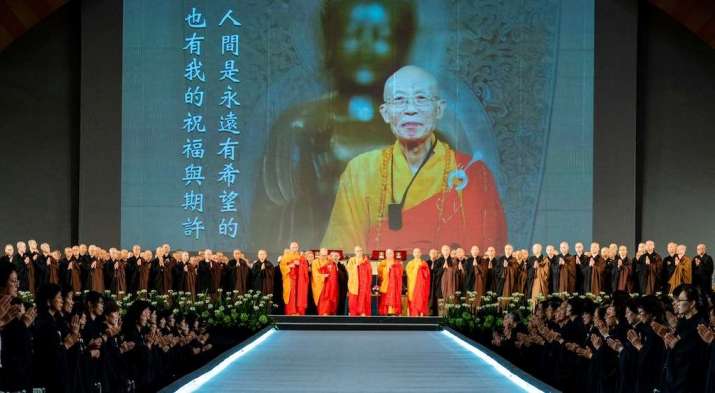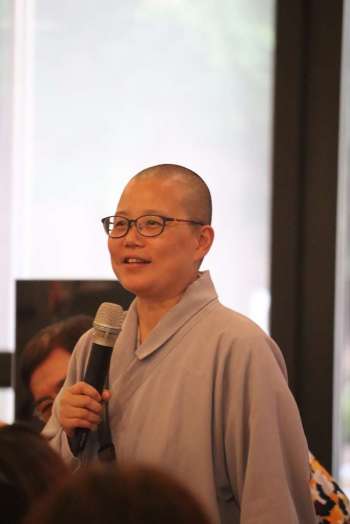
In this article, I am trying to reflect on gender issues—not for the pursuit of gender rights or equality, but for the goal of overcoming the obstacles in practice from some significant and indigenous differences between female and male practitioners. However, I also want to express my gratitude to the many outstanding and strong-willed nuns who have fought and are still fighting for nuns’ rights in different traditions. Without them, we nuns might still be tied up in ourselves and things would never change.
As Chinese Buddhist nuns in a large mix-gendered monastery based in Taiwan like Dharma Drum Mountain, we are privileged to have equal opportunities to receive education, engage in public outreach, and to take responsibility for our organization in many different ways, just as monks do. So why do gender issues still exist?
When I came across an article by Bruce Goldman regarding sex-based differences in the brain* I suddenly realized that there are indeed some unavoidable, hard-to-change differences between nuns and monks in the way we think and handle things. These differences can become an issue in monastic life, and are often mistakenly interpreted as gender unfairness. As a consequence, it takes a lot of time in communication to understand how to bring harmony and stability to the sangha. The following are my personal observations and reflections—they may not apply to all, but I have witnessed them frequently.
Decision-making and problem-resolving
When monks and nuns try to make decisions together, nuns will often foresee many difficulties and problems in the execution of an idea. However, this doesn’t mean we disagree, it means that solutions need to be examined before agreement is granted. Sometimes, I have found that monks are really confused by all the questions nuns bring up and sometimes ask: “So you disagree?” And nuns usually reply: “I am not disagreeing, but . . .”
In other words, nuns like to combine decision-making with (expected) problem-solving, while monks tend to separate them; monks usually address problems only when they actually encounter them. The same mentalities and scenarios come into play when personnel training and job assignments are involved. Often, when there is a higher job vacancy, monks quickly make personnel rearrangements, while nuns will do a 360-degree evaluation of all the candidates and conclude that nobody is suitable for the job, because everyone has foreseen problems that might make them unable to do it perfectly. As expected, monks usually make decisions much more quickly, while nuns react faster when problems arise.

Several years ago, I realized that I too conform to this kind of stereotype. I needed to foresee all possible problems and plan out all the necessary steps before taking action on any project. On top of that, I had high expectations for my sister nuns and our lay volunteers. Inevitably, I had to work day and night to keep everything on track if I was serious about a project, and I grew to dislike this mindset. I left home to be free, but I was trapped by my own behaviors and mentality, making my life no different from the mundane work of secular professionals. And the worst part is, no one was happier because of my existence.
So, I decided to re-train myself. When a project is formulated, I only ask two questions: is it beneficial to people? And do we have enough nun-power? Then a decision is made. Do it, and lower one’s expectations: C is good, at least we move forward; B is wonderful, because we are contributing; A is fantastic, for we are happy about what we are doing; and A+ is an illusion—perfection never happens if we have ego-ness.
Challenges in communication
I am a rational type of person. Things need to make sense, otherwise it’s very difficult for me to just follow the rules. And from my scientific training, I’ve learned to express and explain things logically and with confidence. This habit started causing me a lot of trouble after I joined the monastic sangha.
The following are all my personal experiences and observations and I am sure many monks will be amazed by the depth of my analysis.
1. When rational nuns (like me) work with sensible nuns (them).
If I react to what they say by pointing out what was not rational, and they somehow feel hurt, I was usually the one blamed and they were the victims. It would take me hours of listening to understand how they felt in order to apologize precisely for what I did wrong. But I usually ran out of patience, and that hurt them even more. I realized that I need to use my mind to listen and guess what they really think from what they say, but without using my brain to understand logically what their words mean. To avoid this scenario happening again and again, I really need to cultivate forbearance and compassion.
2. What happens when rational nuns work with sensible monks?
They usually praise us no matter what, and we end up doing all the work! This is not good either. So I need to cultivate right mindfulness so that I am not overwhelmed with too much work.
3. When rational nuns work with rational nuns.
This is tricky. It really depends on whether we like each other. If we like each other, we will quickly reach a compromise and come up a logic that works for both of us, then we move on. If we don’t like each other, then each side will insist on their own logic and try to point out every possible shortcoming of the other to convince them “you don’t understand the whole thing,” until both sides are unable tolerate the situation of “getting nothing done” any longer. Well, at least nobody gets hurt and things move on.
4. What if rational nuns work with rational monks?
These monks tend to get lost in the interrelated totality of our logic. Nuns feel that monks do not think things through thoroughly, and both sides become frustrated. So I guess that if nuns really want to get things worked out faster, we need to train ourselves to tell monks one thing at a time, and if they don’t ask, then don’t tell, don’t explain, and try not to complain. Otherwise, they will think that our minds are unclear. And, of course, we need to force ourselves to keep the thought unspoken that actually their brain is not prepared enough to understand the whole thing. For me, cultivating expedient wisdom, depending on whom I am working with, is a must.
5. What if sensible nuns work with sensible nuns?
Basically, I have no time or patience to write it down; it’s unbelievably complicated!
Make it a strength in practice
I remember one time my late master, after learning that I had decided to become a nun, told me two things:
First of all, he shared that from his observation, the challenge for monks is attraction to women, and many outstanding monks disrobe because of women. And a common problem for nuns is that they might be live in the sangha for 10 years and still not know what their major practices are.
Secondly, he suggested that I pick one sutra and read only that sutra for 10 years and keep my mouth shut for 10 years. “If you can practice this way, you will understand something eventually.” he said. This really was a challenge, because I seldom read a book more than twice, and I like to share and elaborate and link together what I know.
Fifteen years have now passed, I did read one sutra for many years and gained a deeper understanding by making my own way (and not from the commentaries of other masters). Since then, I am able to quickly pick up the key points in other sutras.
Looking back, I can see that focusing on one sutra (single pointedly) helped me to overcome my need-to-know-the-whole-thing mentality, and once I punch through it, my all-related mentality becomes a strength that helps me connect the Dharma together. I really appreciate my master’s instruction for me. It may not be easy for us to change the way our brains are wired, but we can learn how to use them in the right way. It works!
* Two Minds (Wu Tsai Neurosciences Institute, Stanford University)
See more











